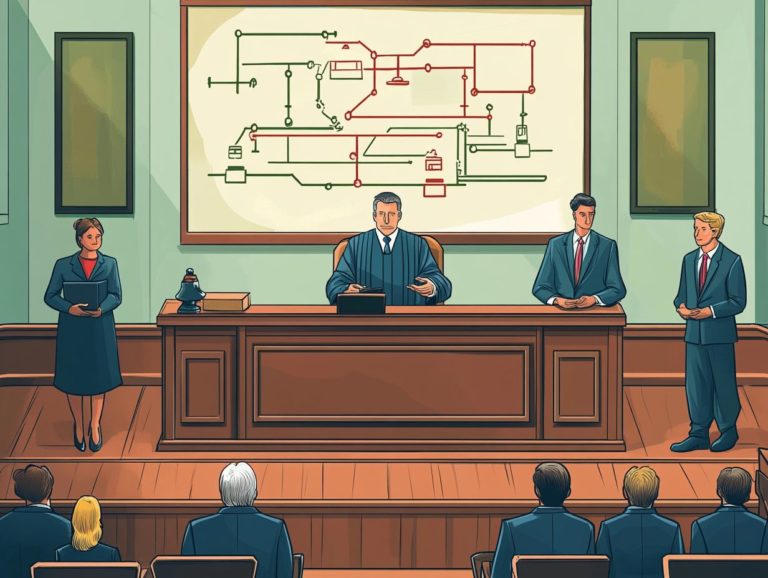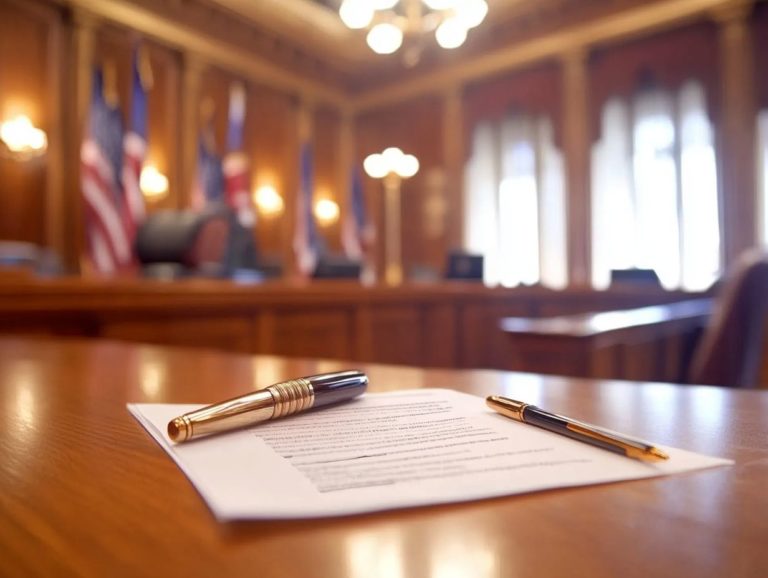5 Effective IP Litigation Tactics for Lawyers
Intellectual property (ideas, inventions, and creative works) litigation presents a complex battlefield for legal professionals, requiring a strategic approach to secure favorable outcomes.
This article delves into five effective tactics that you can employ to navigate IP disputes with success. From conducting thorough research to leveraging expert witnesses, each tactic is meticulously designed to fortify your case and enhance communication with clients.
You ll explore the latest IP laws, the various types of litigation, and essential ethical considerations, equipping yourself with the knowledge to confront these challenges head-on. Whether you re a seasoned attorney or just starting out in the field, this guide provides crucial insights for mastering the intricacies of IP litigation.
Contents
- Key Takeaways:
- 1. Conduct Thorough Research and Investigation
- 2. Build a Strong Case with Evidence and Witnesses
- 3. Utilize Expert Witnesses and Consultants
- 4. Stay Updated on IP Laws
- 5. Use Alternative Dispute Resolution Methods
- What Is IP Litigation and Why Is It Important?
- Frequently Asked Questions
- What are some effective IP litigation tactics for lawyers?
- How can thorough research help in IP litigation?
- What is the role of expert witnesses in IP litigation?
- How can alternative dispute resolution methods be used in IP litigation?
- Why is a strong case strategy important in IP litigation?
- How can lawyers stay updated on IP law developments?
Key Takeaways:

Thorough research and investigation are crucial in IP litigation to build a strong case. Utilize expert witnesses and consultants to strengthen the evidence and increase chances of success. Additionally, consider the 5 ways to leverage IP rights in litigation while staying updated with IP laws and regulations, which is essential in developing effective litigation strategies.
1. Conduct Thorough Research and Investigation
Conducting prompt research is your critical first step in the realm of intellectual property (IP) law, especially when it comes to patents, copyrights, trademarks, and trade secrets.
This essential process empowers you to protect your valuable assets and assert your exclusive rights against potential infringement claims, all while ensuring compliance with the regulations established by the U.S. Patent and Trademark Office and the U.S. Copyright Office.
Understanding these different types of intellectual property is vital for any organization, like yours, seeking to safeguard its innovations and creative works.
Legal research becomes your essential tool in identifying any potential infringements, enabling you to take proactive measures to defend your rights.
When a dispute arises, civil courts serve a pivotal role in resolving conflicts, providing a structured framework for resolving IP claims.
The economic implications of comprehensive investigations are significant. They help mitigate risks and enhance your business’s competitive edge, ultimately leading to improved market positioning and increased revenue potential.
2. Build a Strong Case with Evidence and Witnesses
Building a strong case in intellectual property litigation requires you to carefully collect evidence and strategically use expert witnesses to validate your claims of infringement or violation of exclusive rights. For more insights, consider exploring how to develop a winning IP litigation strategy. This ensures that your legal representation is well-equipped to navigate the complexities of civil court proceedings effectively.
Proper documentation of your intellectual property rights serves as the bedrock for any claim, while expert testimonies can clarify how the alleged infringement affects market value or consumer perception.
A proficient attorney understands the importance of compiling comprehensive records, which may include registration certificates, licensing agreements, and correspondence that underscores your ownership and intended use of the intellectual property.
With skilled argumentation, your attorney enhances the credibility of your claims, making a compelling case for damages that resonates with judges and juries alike.
3. Utilize Expert Witnesses and Consultants
Utilizing expert witnesses and consultants in intellectual property litigation not only enhances the credibility of your claims but also injects specialized knowledge into the courtroom. This enables your legal representation to effectively articulate the economic value of the intellectual property in question while employing sophisticated courtroom strategies.
These professionals fulfill various roles, providing technical insights that clarify the nuances of trade practices and offering economic analyses that can significantly influence the financial implications of your case.
Their testimonies can underscore the commercial importance of the disputed intellectual property, strengthening your argument for damages or the enforcement of rights.
By collaborating closely with your legal team, these experts help navigate complex subject matter, steering the litigation toward a favorable outcome. Their unique perspectives often have the power to sway juries and judges, ultimately contributing to the formulation of compelling legal strategies that resonate throughout the judicial process.
4. Stay Updated on IP Laws

Staying updated on IP laws is essential for you as a legal professional or business owner. It ensures compliance with federal regulations set by the U.S. Patent and Trademark Office and the U.S. Copyright Office. This knowledge helps you navigate the intricate legal duties and time limits surrounding infringement claims.
Considering recent landmark cases and newly enacted statutes, being informed about the evolving landscape of creative works and inventions is crucial. Court rulings that interpret digital copyright nuances can establish precedents significantly affecting your business’s technological endeavors.
Upcoming legislation may introduce new protections for your creative works or innovative inventions. By staying informed about these developments, you not only reduce the risks of potential violations but also position yourself to seize competitive advantages in your market.
5. Use Alternative Dispute Resolution Methods
Alternative dispute resolution (ADR) methods like mediation and arbitration are invaluable tools for intellectual property disputes. They offer effective avenues to resolve conflicts while potentially lowering litigation costs and encouraging amicable negotiations.
These methods accelerate the resolution process, enabling quicker decisions than traditional court proceedings. Choosing mediation or arbitration can reduce your legal fees and costs, making it a more cost-effective solution.
These approaches are confidential, protecting sensitive business information and trade secrets. Many businesses have successfully turned to arbitration to secure injunctions that safeguard their IP rights, allowing them to reach settlements and move forward without prolonged disputes.
What Is IP Litigation and Why Is It Important?
IP litigation involves the legal processes necessary for resolving disputes over rights related to patents, copyrights, trademarks, and trade secrets.
This area of law is vital for protecting your economic interests and maintaining a competitive edge in business relationships. Strong legal representation is essential in these matters.
It plays a crucial role in ensuring that you, as a creator or innovator, can protect your inventions and ideas from unauthorized use or infringement.
By establishing clear legal frameworks, IP law promotes fairness in the marketplace and encourages investment in new technologies and creative projects.
When you navigate these disputes effectively, you can leverage your intellectual property assets to enhance your brand reputation and market share. Thus, having skilled legal counsel is essential.
Attorneys specialized in IP litigation possess the expertise necessary to assert your rights and defend against potential challenges you might face, including the key skills for aspiring IP litigation lawyers.
What Are the Different Types of IP Litigation?
You’ll encounter several types of IP litigation, including disputes over patents, copyrights, trademarks, and trade secrets. To effectively navigate these challenges, consider exploring ways to strengthen your IP litigation team.
Each type arises from specific infringement claims and is typically pursued in civil court. The legal strategies employed vary depending on the type of intellectual property involved.
For example, patent litigation often centers on claims that another party has used or profited from an invention without permission. Copyright disputes usually revolve around unauthorized reproductions or distributions of creative works, such as music or literature.
Trademark litigation surfaces when a brand owner suspects that another business is using a confusingly similar mark, potentially misleading consumers.
Lastly, trade secret litigation deals with the theft or unauthorized use of confidential business information, such as formulas or strategies.
Each of these types of litigation demands a tailored legal approach and relies on different evidentiary standards to establish claims and defenses.
What Are the Common Challenges in IP Litigation?

IP litigation brings several common challenges your way. These include establishing damages, understanding complex legal tactics, managing litigation costs, and effectively utilizing expert witnesses to bolster your case. To navigate these challenges successfully, it’s crucial to develop the essential skills for IP litigation attorneys. Each of these factors can significantly sway the outcomes of disputes.
Among these hurdles, determining how much money you should receive often stands out as particularly daunting due to the subjective nature of intellectual property value. Without clear metrics, you might struggle to present compelling arguments for compensation, which could lead to the undervaluation of your claims.
The complexities of legal strategies can complicate matters further. Adjusting your tactics to counter a rival s approach requires not just legal expertise but also an intuitive understanding of the broader market context.
Engage specialized experts early to ease these challenges. Their insights can provide valuable perspectives on realistic damage assessments and strategic direction, enhancing your ability to navigate the complexities of IP disputes.
How Can Lawyers Effectively Communicate with Clients in IP Litigation?
Effective communication between you and your lawyer is vital in IP litigation. It builds trust, maintains your business relationships, and enables your attorney to leverage their expertise in addressing your concerns and developing strategic legal approaches.
Transparency is key. Providing a clear understanding of the legal landscape and developments in your case is essential. Regular updates about important milestones can significantly ease your anxiety, setting the stage for knowledge-based decision-making.
When your inquiries whether about ongoing proceedings or emerging issues are met with prompt responses, it cultivates a collaborative environment where you feel valued and engaged. By enhancing your awareness of the intricacies involved, attorneys can effectively demystify complex intellectual property matters, making your legal journey much more navigable.
What Are Some Successful IP Litigation Cases?
Several successful IP litigation cases have established significant legal precedents. These offer valuable insights into the enforcement of intellectual property rights, the calculation of damages, and the broader implications for business interests across various industries, highlighting the importance of following 5 essential steps for IP litigation readiness.
Take the ruling in ‘Apple v. Samsung,’ for instance. This landmark case not only highlighted the critical importance of design patents but also set benchmarks for calculating damages in patent infringement disputes. It has since influenced how tech companies like yours approach product design and litigation strategies, all while emphasizing the need to innovate and protect proprietary technologies.
Similarly, the ‘Harper & Row v. Nation Enterprises’ case underscored the significance of fair use, shaping how publishers and content creators interpret and apply copyright laws. These landmark cases can inspire your own strategies and have created a ripple effect in the legal landscape, compelling businesses to rethink their IP strategies and advocate for more robust enforcement mechanisms across various sectors.
What Are the Ethical Considerations in IP Litigation?
Ethical considerations in IP litigation encompass a range of legal duties that you, as an attorney, must adhere to. This includes maintaining client confidentiality, avoiding conflicts of interest, and ensuring transparent communication throughout the litigation process.
These obligations are not just formalities; they play a vital role in protecting your clients’ interests and upholding the integrity of the legal system. You must navigate the fine line between aggressive representation and ethical conduct, as any misstep that compromises trust can severely damage the attorney-client relationship.
Your accountability extends beyond your clients to the courts and the broader judicial system, where your actions shape how the public views legal professionalism. By balancing these responsibilities, you contribute to a culture of trust and respect, emphasizing the crucial role of ethics in preserving justice and fairness within intellectual property disputes.
Frequently Asked Questions

What are some effective IP litigation tactics for lawyers?
Lawyers can adopt several effective tactics in IP litigation. These include thorough research, using expert witnesses, and implementing key strategies for successful IP litigation to build a solid case strategy.
How can thorough research help in IP litigation?
Thorough research gives lawyers a clear understanding of the case. It includes relevant laws and potential defenses, which are critical for anticipating opposing arguments.
What is the role of expert witnesses in IP litigation?
Expert witnesses provide specialized knowledge on complex issues. Their insights strengthen a lawyer’s arguments and support the overall case strategy.
How can alternative dispute resolution methods be used in IP litigation?
Methods like mediation or arbitration resolve IP disputes without court. This approach saves time and money while maintaining confidentiality and achieving satisfactory outcomes for both parties.
Why is a strong case strategy important in IP litigation?
A solid case strategy allows lawyers to present arguments effectively. It also helps them anticipate and counter opposing arguments, boosting their chances of success.
How can lawyers stay updated on IP law developments?
Lawyers can stay informed by attending seminars and reading industry publications. Networking with colleagues and joining professional organizations also helps them keep up with changes in IP law.






